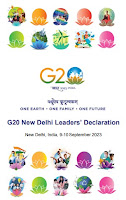G20 Special Part I: The Delhi Declaration and its outcomes.
India has managed to pull off a feat that was once considered to be near impossible: Forging a consensus, and signing a declaration despite the deep divisions that loom large on the world. This is widely considered to be a diplomatic win for India as it takes its place on the high table of global affairs. This blog is divided into two parts: The first being the official outcomes of the G20 summit, the Delhi Declaration and related talks under the G20 framework, and the second being the talks on its sidelines, the initiatives taken outside its framework, and their implications on India's national interest, global geopolitics, and the world order at large.
The Delhi Declaration is seen as a document that tries to amplify the voice and interests of the Global South, which is becoming more influential in global matters, and seeks to challenge the unofficial monopoly of decision-making of the G7, and its allies in the West. It also seeks to establish an agreement on other issues concerning the developing world, which are not directly tied to the conflict in Ukraine, but are in turn affected indirectly because of its implications.
Addressing the elephant in the room, the Ukraine conflict has been condemned, but Russia itself finds no mention in the final document, instead being implicitly criticised for its adverse effects on the world. The outcome would be one that neither the West nor Russia wanted in its entirety, but the compromise brokered by India, seems to have satisfied both sides to such an extent that they could sign off on the declaration. Both the West and Russia are claiming victory, with Scholz, the German chancellor, saying that the words used in the declaration sufficiently highlight the negative effects and the opposition of the conflict in Ukraine, and the Russian Foreign Minister Sergei Lavrov, claiming that the declaration was "balanced", and that the G20 was undergoing an "internal reform of sorts" to better reflect the Global South's interests.
The G20 Delhi Declaration has also made considerable progress on the front of climate change, as the declaration speaks about inclusive ways to lean away from traditional fossil fuel sources, and enable developing countries to also efficiently and effectively adopt more sustainable sources of energy, while also launching a new Global Biofuels Alliance in order to promote the widespread use of and finding ways to effectively adopt biofuels. This has been a huge concern, especially for developing countries, because of the relative 'imposition' of the West's will on developing countries to switch to renewables at a time where many such countries are physically and/or fiscally incapable of doing so. The Delhi Declaration provides a concrete framework and a roadmap to accomplish the Sustainable Development Goals as set out by the UN, which takes all countries, even the Global South's considerations into account, as opposed to Western initiatives that aim to just throw money at the problem.
The declaration also focuses on digital public infrastructure, the use of information technology for responsible and inclusive governance, as well as acknowledging the pivotal role of artificial intelligence in global governance, acknowledges its risks, and promotes its responsible use to address pressing global issues. Mentions have also been made about cryptocurrency and the regulation of its related assets, moving towards adopting a system of central bank digital currencies as a possible alternative to cryptocurrencies, the use of effective digital solutions in the development of further financial, health-related and cultural inclusivity among the G20 members, the condemnation of terrorism in all its forms and combating it by providing further strength to institutions such as the Financial Action Task Force, and the effective restructuring of debt for developing countries so as to not undermine their sovereignty and territorial integrity.
In conclusion, the G20 Delhi Declaration has made incredible progress on a wide variety of issues that plague the world as a whole, has demonstrated the continued relevance of the G20 in the shaping and implementation of global policy decisions, and has also made the G20 itself a more inclusive organization that better reflects all global viewpoints, concerns, and ideas that aim to make the world a better place to live and provide a better future for further generations.




Comments
Post a Comment